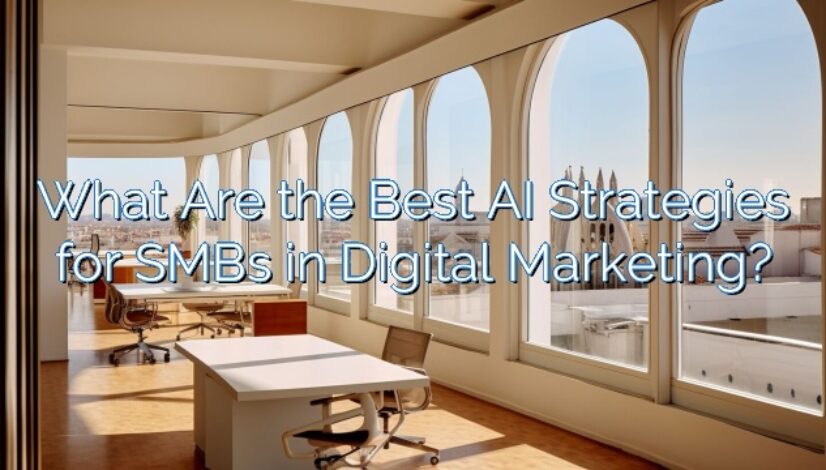What Are the Best AI Strategies for SMBs in Digital Marketing?
In today’s fast-paced digital landscape, small and medium-sized businesses (SMBs) face the challenge of standing out among competitors. Leveraging artificial intelligence (AI) strategies in digital marketing can be a game-changer for these businesses. By identifying target audiences, personalizing customer experiences, automating campaigns, enhancing data analysis, and improving customer support, SMBs can gain a competitive edge. In this article, we will explore the best AI strategies that SMBs can implement to achieve mastery in digital marketing.
Key Takeaways
- Behavioral segmentation and market research are crucial for SMBs to identify their target audiences and understand their demographics, psychographics, and buying behaviors.
- Personalizing customer experiences using AI-powered recommendation engines and tailoring content based on individual behavior and preferences can greatly improve customer satisfaction and loyalty.
- Automating marketing campaigns through AI-driven automation can help SMBs schedule social media posts, send personalized emails, manage ad campaigns, and optimize ad spend, resulting in more targeted and personalized marketing messages.
- Enhancing data analysis and insights with AI, such as predictive modeling and real-time analytics, can help SMBs transform complex data into visually appealing visualizations and drive business growth.
Identifying Target Audiences
The identification of target audiences is a crucial step in implementing effective AI strategies for SMBs in digital marketing. By understanding the behavior and preferences of different customer segments, businesses can tailor their marketing efforts to reach the right people at the right time, increasing the chances of conversion and customer satisfaction.
Behavioral segmentation plays a key role in identifying target audiences. This approach categorizes customers based on their actions, such as previous purchases, website interactions, or engagement with marketing campaigns. By analyzing these behaviors, businesses can gain insights into customers’ preferences, interests, and needs, allowing them to create personalized marketing messages and experiences.
Market research is another essential tool for identifying target audiences. It involves gathering data about the market, industry trends, and customer preferences through surveys, focus groups, and online analytics. This information helps businesses understand their target market’s demographics, psychographics, and buying behaviors, enabling them to refine their AI strategies accordingly.
Personalizing Customer Experiences
To enhance customer satisfaction and drive conversions, SMBs can leverage AI strategies to personalize customer experiences based on their preferences and behaviors. By improving recommendations and tailoring content, businesses can create a more personalized and engaging experience for their customers.
AI-powered recommendation engines analyze customer data to understand their preferences and make relevant product or content suggestions. This helps businesses deliver personalized recommendations, increasing the chances of a customer making a purchase. For example, an online clothing store can use AI algorithms to recommend items based on a customer’s past purchases, browsing history, and demographic information.
Additionally, AI can help businesses tailor content to individual customers. By analyzing customer behavior and preferences, AI algorithms can determine the type of content that resonates best with each customer. This enables businesses to deliver targeted messages, offers, and promotions, ultimately driving higher engagement and conversions.
Personalizing customer experiences through AI not only improves customer satisfaction but also strengthens customer loyalty. When customers feel understood and valued, they are more likely to return and recommend the business to others.
As we delve into automating marketing campaigns in the next section, AI will play a pivotal role in streamlining and optimizing marketing efforts, ensuring that businesses can effectively reach and engage their target audiences.
Automating Marketing Campaigns
Building off the previous subtopic on personalizing customer experiences, SMBs can leverage AI strategies to automate their marketing campaigns and optimize their reach and engagement with target audiences. AI-driven automation allows businesses to streamline their marketing efforts by automating repetitive tasks, such as scheduling social media posts, sending personalized emails, and managing ad campaigns. By implementing AI technology, SMBs can save time and resources, allowing them to focus on other important aspects of their business.
One of the key benefits of AI-driven automation is its ability to optimize ad spend. AI algorithms can analyze vast amounts of data and make data-driven decisions on where and when to allocate ad budgets. By continuously monitoring and adjusting ad campaigns in real-time, AI can help SMBs maximize their return on investment and ensure that their ads are being shown to the right audience at the right time.
In addition to optimizing ad spend, AI-driven automation can also improve the overall effectiveness of marketing campaigns. By analyzing customer data and online behaviors, AI can provide valuable insights into customer preferences and interests. This allows SMBs to create more targeted and personalized marketing messages that resonate with their target audience, increasing engagement and conversion rates.
Enhancing Data Analysis and Insights
Continuing the exploration of AI strategies for SMBs in digital marketing, a crucial aspect to consider is enhancing data analysis and insights. With the help of AI technologies, businesses can leverage predictive modeling and real-time analytics to gain valuable information from their data. Here are three ways AI can enhance data analysis and insights:
- Predictive modeling: AI algorithms can analyze historical data and identify patterns and trends, enabling businesses to make accurate predictions about future outcomes. By leveraging predictive modeling, SMBs can make data-driven decisions, optimize their marketing strategies, and anticipate customer behavior.
- Real-time analytics: AI-powered tools can process large volumes of data in real-time, providing businesses with up-to-date insights. This allows SMBs to respond quickly to changing market conditions, identify emerging trends, and make timely adjustments to their marketing campaigns.
- Intelligent data visualization: AI can transform complex data into visually appealing and easy-to-understand visualizations. This enables SMBs to gain a deeper understanding of their data, identify key insights, and communicate them effectively to stakeholders.
Enhancing data analysis and insights through AI technologies can empower SMBs to make informed decisions, improve marketing effectiveness, and drive business growth. With a solid foundation in data analysis, businesses can now shift their focus to improving customer support and engagement.
Improving Customer Support and Engagement
After enhancing data analysis and insights, the next crucial step for SMBs in digital marketing is to focus on improving customer support and engagement. In today’s competitive landscape, providing exceptional customer service is paramount to gaining a competitive edge and building long-term customer relationships. AI technologies can play a significant role in enhancing customer support and engagement by increasing response time and facilitating social media interaction.
One way AI can improve customer support is by automating responses to frequently asked questions. By using natural language processing algorithms, AI-powered chatbots can provide instant answers to customer inquiries, reducing wait times and improving overall satisfaction. Additionally, AI can analyze customer interactions and sentiment on social media platforms, allowing businesses to proactively address any concerns or issues before they escalate.
To further enhance customer engagement, SMBs can leverage AI to personalize their marketing efforts. By analyzing customer data, AI algorithms can identify individual preferences and tailor content and offers accordingly. This personalization not only increases customer satisfaction but also boosts conversion rates and customer loyalty.
In summary, improving customer support and engagement is a critical step for SMBs in digital marketing. By leveraging AI technologies to increase response time and facilitate social media interaction, businesses can provide exceptional customer service, enhance customer engagement, and ultimately drive growth and success.
| Benefits of AI in Customer Support and Engagement | Examples | Impact |
|---|---|---|
| Automating responses to frequently asked questions | AI-powered chatbots | Reduces wait times, improves customer satisfaction |
| Analyzing customer interactions on social media | Sentiment analysis algorithms | Allows proactive addressing of concerns, enhances brand reputation |
| Personalizing marketing efforts | AI algorithms analyzing customer data | Increases customer satisfaction, boosts conversion rates, enhances customer loyalty |
Frequently Asked Questions
What Are Some Common Challenges Faced by SMBs When It Comes to Identifying Target Audiences?
Identifying target audiences is a common challenge faced by SMBs in digital marketing. Without the context of AI strategies, SMBs often struggle to effectively reach and engage their desired customer base. Understanding the specific needs, preferences, and behaviors of target audiences is crucial for developing successful marketing strategies. SMBs need to invest in market research, data analysis, and customer segmentation to overcome these challenges and optimize their digital marketing efforts. By leveraging AI technologies, SMBs can gain valuable insights and automate processes to better identify and target their audiences.
How Can SMBs Ensure That Their Personalized Customer Experiences Are Effective and Resonating With Their Target Audience?
To ensure that personalized customer experiences are effective and resonating with their target audience, SMBs need to focus on measuring effectiveness and improving customer engagement. This can be achieved by implementing various strategies such as conducting regular customer feedback surveys, analyzing data to identify patterns and preferences, and leveraging AI technologies to automate and personalize marketing campaigns. By continuously evaluating and adjusting their strategies based on these insights, SMBs can optimize their customer experiences and drive better results.
Are There Any Specific Marketing Automation Tools or Platforms Recommended for SMBs to Automate Their Marketing Campaigns?
When it comes to automating marketing campaigns, there are several specific marketing automation tools and platforms that are recommended for SMBs. These tools can help SMBs streamline their marketing processes, save time, and increase efficiency. Additionally, incorporating AI in SMB marketing campaigns can bring numerous benefits, such as improved targeting, personalized customer experiences, and data-driven decision making. By leveraging these tools and strategies, SMBs can effectively automate their marketing campaigns and achieve better results.
What Are Some Key Metrics or Indicators That SMBs Should Focus on When Analyzing Data and Gaining Insights From Their Digital Marketing Efforts?
Key performance indicators (KPIs) play a crucial role in analyzing data and gaining insights from digital marketing efforts. SMBs should focus on metrics such as conversion rates, which measure the effectiveness of marketing campaigns in driving desired actions from customers. Other important metrics include customer acquisition cost, return on ad spend, and lifetime value of customers. These indicators provide valuable insights into the success and efficiency of SMBs’ digital marketing strategies.
How Can SMBs Leverage AI to Improve Their Customer Support and Engagement Processes?
By leveraging AI, SMBs can significantly improve their customer support and engagement processes. AI-powered chatbots and virtual assistants can handle customer inquiries and provide real-time assistance, enhancing the overall customer experience. Additionally, AI-driven sentiment analysis and social listening can help SMBs gain insights into customer preferences and sentiments, enabling them to tailor their marketing strategies accordingly. These AI strategies empower SMBs to efficiently engage with their customers, enhance customer satisfaction, and drive business growth.
Conclusion
In conclusion, AI strategies have the potential to greatly benefit SMBs in digital marketing. By identifying target audiences, personalizing customer experiences, automating campaigns, enhancing data analysis, and improving customer support, SMBs can increase their efficiency and effectiveness in reaching their marketing goals. With AI at their disposal, SMBs can level the playing field and compete with larger corporations in the digital marketing landscape. As the saying goes, “Fortune favors the bold,” and embracing AI is a bold move that can lead to significant growth and success for SMBs. By leveraging these advanced tools, SMBs can optimize their resources, making smarter decisions without the need for extensive budgets or large teams. AI leveling the playing field means that smaller businesses can now compete on equal footing with industry giants, creating more opportunities for innovation and creativity. Ultimately, staying ahead in the digital era requires not just adoption but a commitment to understanding and fully integrating AI into marketing strategies. By leveraging these advanced tools, SMBs can not only drive better marketing outcomes but also build stronger connections with their customers, fostering loyalty and trust. Moreover, AI plays a crucial role in boosting small business branding by enabling consistent messaging and creating memorable, tailored interactions across multiple channels. Ultimately, adopting AI empowers SMBs to establish a distinct identity in a crowded marketplace, paving the way for long-term sustainability and growth. By integrating AI into their operations, small and medium-sized businesses can unlock innovative tools and insights that were once only accessible to larger enterprises. A successful marketing strategy for SMBs now depends on their ability to adapt to these advancements and leverage AI to create more targeted and impactful campaigns. Ultimately, those who embrace this technology will be better positioned to navigate the evolving digital landscape and achieve long-term success.



